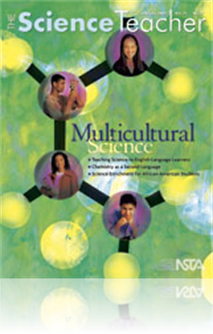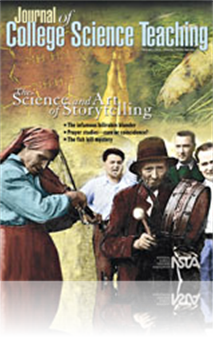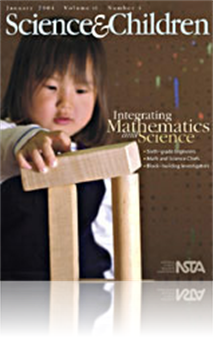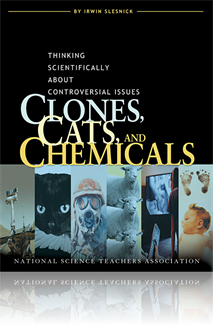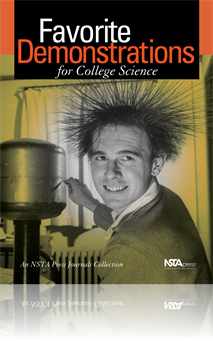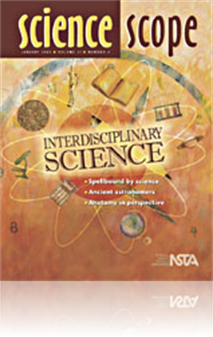All Resources
Journal Article
The experts address the following question in this month’s column: How do solutes reduce the vapor pressure of a solvent?...
Journal Article
Professional Development for You
No Child Left Behind’s emphasis on accountability and demands for a quality teacher in every classroom has spawned a cottage industry of providers of professional development. How can educators begin to sort through them all to find the right choic...
Journal Article
The medieval Spanish custom in which blind storytellers went from town to town telling stories (sung as mantras) of murder, impassioned love, and pestilence to the villagers as a means of sustaining themselves were known as Coplas de Ciego, or Bli...
Journal Article
Moderation, or the interactive analysis of student work by small groups of teachers, can help to qualify student understanding and increase teacher sensitivity to student progress with difficult concepts. This article describes how the process of mod...
Journal Article
Science 101? What Causes Rainbows?
If you look at a rain cloud with the Sun behind your back, the sunlight and water drops may interact just right, revealing the familiar arc of red, orange, yellow, green, blue, indigo, and violet. Many of us have been pleasantly surprised to see a r...
Journal Article
Scope on Safety: Essential First Aid for Science Teachers
From a practical standpoint, science teachers should be trained to respond to incidents involving burns, bleeding, chemical exposure, swallowed poisons, penetrating objects, lacerations, and shock. Basic training is required to properly handle these ...
Journal Article
Science Sampler: Digital Field Trips
"Take only photographs. Leave only footprints." This is the author's motto as she bubbled forth with ideas and images after taking a digital camera along on trips to Utah, Yellowstone National Park, the Rocky Mountains, and other sites. She collected...
Journal Article
Society for College Science Teachers: The Good, the Bad, and the Ugly—Introductory Biology Textbooks
As editions of textbooks age, we are all forced to reexamine the universe of books and select one to use for three to four semesters. After 30 years of selecting textbooks, the author is still confronted with the fundamental question: Why is it so di...
Journal Article
Teaching Through Trade Books: Water Wherever
Whether rain, sleet, or snow, February weather across the country provides students with opportunities to observe the many different ways the water cycle affects our daily lives. This month's trade books that focus on the water cycle include The Snow...
Journal Article
Many ESOL (English for Speakers of Other Languages) students are in classes primarily devoted to improving English language skills at the expense of other disciplines, such as science. The authors designed a project that brought ESOL students into a ...
Journal Article
AIM for Professional Development
Instructional materials help guide both what and how teachers teach and what and how students learn. Most educators, however, are not aware that the selection of instructional materials can serve as energizing, engaging professional development. This...
Journal Article
Chemistry as a Second Language
Chemistry is a unique language in and of itself that can be difficult for students to understand. As a result, the basic curriculum approach described in this article was designed to make chemistry more accessible to students, especially those who ar...
Journal Article
The universality of the genetic code has allowed DNA isolated from a specific organism to be transferred and incorporated in another organism, transforming bacterial, yeast, plant, and animal cells. This transformation ability is the essence of recom...
Journal Article
This article provides a number of practical strategies for teaching science to English Language Learners (ELLs). The strategies were developed by educators participating in science/ELL workshops and through the author’s own experience as a science ...
Journal Article
Students read an article about a study of the effects of intercessory prayer on cardiac patients published in a renowned medical journal. After reading the case and discussing the questions in small groups, students evaluate the study for its scienti...
Journal Article
Using Easy-Bake Ovens to Teach Chemistry
After participating in an internship at the American Institute of Baking, the author developed an innovative way for students to explore basic chemistry concepts through bakery science. An Easy-Bake Oven is a quick and safe oven that is perfect for t...
Journal Article
In this case, students speculate on what may have caused a major fish kill in an estuary in North Carolina. In the process they explore how land runoff and excess nutrients affect aquatic communities and learn about the complex life cycle of the dino...
Journal Article
The term inquiry has been used to form curriculum goals, design instructional strategies, and assess learning. The term also describes what scientists do. Within the science classroom, inquiry is used to promote activity-oriented learning that ref...
Journal Article
Commentary: Personal Guiding Frameworks and Equity Teaching Practices
The No Child Left Behind Act of 2001 (NCLB) requires that science educators use research-based teaching strategies. This month’s Commentary column cites the following references as excellent resources for science educators to use as personal guidin...
Journal Article
Scope on the Skies: Convening with Comets
In February 2004, not only were the four brightest planets visible across the evening skies, but there was a comet rendezvous mission nearly completed while another was just getting started. Comet missions not only provide information about comets an...
Journal Article
Home Connections: Thumbs Are Handy Digits
Hold your hand out in front of you and look a it carefully. The human hand is made up of four fingers and one thumb. Have you ever thought about how much you use your thumb? This month’s Home Connections activity helps students understand the imp...
Journal Article
Science Sampler: ExploraVision's professional development opportunities
Professional development can take many forms. One unusual approach recommended by the author is participation in NSTA's futuristic science event, ExploraVision. It requires teams of students to investigate a problem and then develop an invention to s...
Journal Article
Teacher Quality: From Policy to Practice
The No Child Left Behind act requires schools to have “qualified teachers” in every classroom by the 2005-2006 school year. This mandate has made professional development a priority. This article defines quality professional development, describe...
Journal Article
Sun-Earth Day 2004: Transit of Venus
On June 8th, 2004 a celestial event of historical scientific importance occured when the silhouette of the planet Venus crossed the face of the Sun as seen from the Earth. This event, known as the transit of Venus, last occurred in 1882. Through para...
Journal Article
Two Peas in a Pod? A Case of Questionable Twins
Based on an actual event, this case study focuses on problems associated with reproductive technologies. It tells the story of the “Jones” who, after in vitro fertilization treatment, discovered that their fraternal twins were less similar in app...
Journal Article
Editor’s Corner: Opening the Door to Science
The national standards have refocused our thinking about teaching and learning science. Science isn’t reserved only for future astronauts or heart surgeons. Everyone can do science, and previously we hadn’t been reaching the majority of our stude...
Journal Article
Two university educators and a sixth-grade teacher collaborated to create and implement a five-day engineering unit that incorporated both mathematics and science concepts and hands-on learning. In this series of engineering activities, students tes...
eBook
Clones, Cats, and Chemicals: Thinking Scientifically About Controversial Issues (e-Book)
Does human cloning present a threat or an opportunity? Do common cats constitute a major threat to wildlife? Will the development of new chemical and biological weapons deter war or lead to it? If you want students to think—really think—about the...
eBook
Favorite Demonstrations for College Science (e-book)
Peer-reviewed, classroom-tested, and tailored specifically for introductory science courses, Favorite Demonstrations is an essential complement to every college instructor’s lesson plans. The book is an all-in-one compilation of 36 popular cl...
Journal Article
Science Sampler: Sending in the Pinch Hitter
Even the most conscientious teacher will eventually need a substitute. The classroom can continue to function smoothly and effectively when substitute planning is viewed as another important aspect of preparation. Like any pinch hitter, the substitut...
Journal Article
I Lost the Answer Key! Authentic science flourishes when a teacher loses the prepared answer key
A popular exploratory activity is “Mystery Powders,” a chemistry investigation during which students identify the composition of white, powdery mixtures. In this article, the teacher loses the key to the mystery powders lab and the students take ...
Journal Article
Racing with the Sun: Students learn physics while designing a solar-powered vehicle
Through this yearlong inquiry investigation, high school physics students design, create, and race a solar-powered vehicle. The design process helps students learn invaluable science, technology, mathematics, communication, and critical thinking skil...



